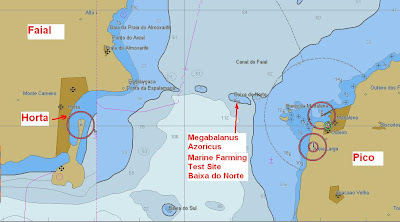Our friends João and Ana from S/V Danny Boy decided that we should be introduced to some of their favourite typical Azorean food and took us to the Restaurante O Silva in Ribeira Grande in order to, amongst other things, eat the local delicacy "Rocks". Soon a plate full of "Rocks" was placed before us together with the necessary tools to attack them with - namely a sort of small skewer with a bent tip and half a straw. Ana and João then proceeded to give us a lesson in how to use them
The "Rocks" turned out to be the giant barnacle, Megabalanus Azoricus, which is endemic to the Azores Archipelago. In the Azores these are known as Cracas
The skewer with the bent tip is required in order to extract the animal from its shell
and the half straw is then used to suck out the tasty, salty juice - a very special tasty dish
This was then followed by grilled Limpets or Lapas Grelhadas

The main course was Arroz de Cherne or White Grouper in saffran rice
followed by two bean based delicious sweet deserts Queijada de Feijão and Pudim de Feijão
The restaurant then kindly presented us with bleached Cracas shells and a bent skewer as a souvenir

Thank you very much Ana and João for such a delicious, memorable meal.
I have since been doing a bit of googling to find out more about Megabalanus Azoricus.

The skewer with the bent tip is required in order to extract the animal from its shell
and the half straw is then used to suck out the tasty, salty juice - a very special tasty dish
This was then followed by grilled Limpets or Lapas Grelhadas

The main course was Arroz de Cherne or White Grouper in saffran rice
followed by two bean based delicious sweet deserts Queijada de Feijão and Pudim de Feijão
The restaurant then kindly presented us with bleached Cracas shells and a bent skewer as a souvenir

Thank you very much Ana and João for such a delicious, memorable meal.
I have since been doing a bit of googling to find out more about Megabalanus Azoricus.
In addition to the Azores, this barnacle can be found in the archipelagos of Madeira and Cape Verde.
However, as it is such a delicacy, it is in danger of being over-harvested and OSPAR, the European organisation charged with protecting the marine environment of the North-East Atlantic has put it on the danger list for over fishing - please click on the below link:-
In order to conserve the species whilst catering for the tastes of the islanders, Horta University has instigated a pilot project to investigate the possibility of marine farming the Megabalanus Azoricus.
This study was conducted in Baixa do Norte (38º32' 26,342”N 28º33' 50,726”W) , a shallow water bank (minimum depth of 17.5 meters) located in the channel separating the islands of Faial and Pico, a zone characterised by strong currents of up to 1m/s.
Lets hope it will be possible to farm the barnacle as it would certainly leave an unfortunate gap in Azorean cuisine if harvesting were to be banned !
More can be found on Horta Universities website - please click on the below link:-






No comments:
Post a Comment